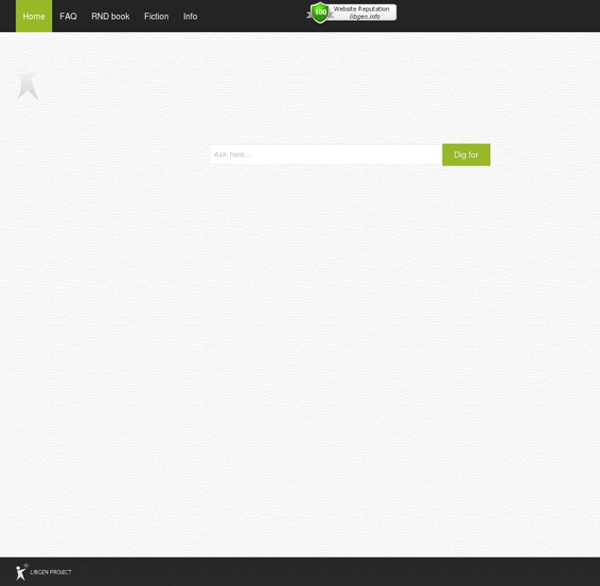



http://croco.freeonsciencelibraryguide.com/
The Online Books Page: Search Examples: Entering austen, jane in the Author field finds books by Jane Austen. Entering Baum in the Author field and and oz in the Title field finds L. Frank Baum's Oz books. Entering dosto in the Author field, choosing the Exact start of name option, and entering underground in the Title field finds Fyodor Dostoyevsky's Notes from the Underground, even if you don't remember how to spell more than the start of the author's name! (Hey, we've changed the spelling in our own database at least once.)
Apophysis Culture Culture Tweeting the A-League: The Success Story So Far Snurb, 10 October 2013 Now that the AFL and NRL Grand Finals are over, Australia turns its attention again towards real football: the A-League season 2013/14 starts this Friday. That’s a good enough reason to review how the game has [...] Australian Reality TV on Twitter: A Two Horse Race welcome - library.nu MobileRead Forums where material book culture meets digital humanities » Wynken de Worde Below is the text from a talk I gave at the Geographies of Desire conference, held at the University of Maryland on April 27-28. Almost everything that I said there is something that I’ve said here before, so faithful readers won’t find much that’s new. But I promised I’d stick it up here, so here it is! If you’re simply looking for the set of links to the resources I mentioned, you can find those on Pinboard.
eResearch and Digital Humanities: a broader vision? Digital Heat: Vast underground machines run by downtrodden humanists power 'Metropolis. I have been having many conversations with people of late around the boundaries of ‘eResearch’ and ‘Digital Humanities’. And I have received lots of divergent and interesting responses from both researchers and professionals working in various ways with computing in the humanities. And there does tend to be little agreement about certain aspects of the landscape; many researchers have ‘discovered’ computing in the humanities from their own particular perspective and this perspective is often lacking generosity towards the richer and deeper veins of thought and helmsmanship provided by the long history of computing in humanities research and teaching (ie. the digital humanities). The eResearch community in Australia has done some fantastic work in terms of building and maintaining repositories and addressing related issues around data management and data re-use.
tripleC - Cognition, Communication, Co-operation Towards Marxian Internet Studies Christian Fuchs Abstract This article gives an overview of example approaches of Critical Internet Studies and points out key concepts of this field. Critical Cyberculture Studies and Critical Political Economy/Critical Theory of the Internet are identified as two approaches in Critical Internet Studies.